I wanted to explain spiritual warfare in this second part of What’s the Deal with the Devil series. But the topic is simply too big for one post. Instead, we’ll break it into parts. This first will look at what Satan wants, or in more military terms, what are the objectives he wishes attain in the spiritual war with God? Then afterwards we’ll look at how the Devil tries to attain those goals, which will open the door to discussing how believers in Christ in general and Christian artists more specifically should counter what Satan is trying to achieve.
The Approach
“Epistle Bias”: The first thing is to state up front I have a bias in favor of the Epistles. What I mean by that is while Bible books that contain historical events like the Gospels and Acts are interesting to Christian readers and reveal what is possible, we cannot be certain that the specific events they record are normal and still happen the same way today. Certain things we definitely know are not going to happen today like they happened as recorded in the Bible–Jesus is no longer in Galilee and no longer walks on water there. But the Epistles, in which apostles wrote to churches and issued out specific commands and guidance, these are like the owner’s manual for believers. They are the directions we have to work from, the specific instructions God gave out for Christians to follow. Of course, sometimes historical books state general principles instead of relating specific events, in which case their references are equal to the Epistles. But in general I will only reference parts of the Bible outside the Epistles when they relate things that the letters of apostles to Christian churches say as well.
(Note not all Christians would agree with me the Epistles are more important–that’s why I’m telling you up front they are from my perspective.)
Assumption Based on What Satan Does:Â The assumption is those things Satan is attributed to doing are those things what he wants to do. Warnings about Satan and commandments concerning the Devil are geared towards stuff the Devil is actually trying to accomplish. I suppose hypothetically Satan could be wanting to do other things, but if we are not told about other actions or warned about them in the letters to Christian churches (a.k.a. the Epistles) we can safely assume any other motivations are unimportant to us.
The Results
What the Epistles Don’t Contain: It’s important to mention what the Epistles don’t say because there are Christians who strongly advocate a view of spiritual warfare for which there are no clear instructions in the Bible. Which I would say should alter our view of such practices. To start out:
There are no direct commands or instructions in the Epistles in how to deal with demonic possession, i.e. specific instructions on how to get a demon out of someone. This is true even though the Gospels and Epistles have many examples of Jesus or the apostles confronting someone who was demon-possessed. Presumably, from parts of the Bible other than the letters to churches, it’s still possible for a person to “have an unclean spirit.” But apparently casting out demons isn’t a normal or major aspect of the Christian life for most believers because otherwise the Epistles would give guidance on how to do it–and it’s true the Epistles never say how, even though they talk multiple times about spiritual warfare and how to have victory in it.
I can offer a specific suggestion as to why this is so–though I will in part make reference to a historical event in the Gospels to do so. Matthew 17:21 and Mark 9:29 refer to a demon that Jesus’s disciples could not cast out but afterwards he explains to them that whatever method they were using that wouldn’t do the trick, prayer and fasting would work instead. This seems to indicate that prayer and fasting are more powerful than casting out demons–and the Epistles contain plenty of commands to pray (there’s fewer references to fasting, but there are some, e.g. I Cor 7:5). Ergo, there’s no need to tell you how to do the lesser thing if you’ve already been told to do the greater.
However, I can’t say for certain this is the case–if one of the Epistles had plainly said, “You don’t have to worry about casting out demons because prayer and fasting will take care of them”–then I’d be certain. But there is no such clear statement. Still, there are no commands or instructions on how to cast out demons–and that’s a clear enough indicator for me that battling demons directly is not a normal part of spiritual warfare or the Christian life. Because again, God specifically tells us those things we need to know concerning how to have victory in our spiritual lives.
Nor are there any instructions about clearing physical space of demons like rooms or cities or any other physical terrain. Note the Bible doesn’t even contain any clear examples of physical terrain being cleared out of demonic control (Jesus never expelled the demons in, say, Capernaum, but rather the demons in people there and elsewhere on a per person, not per place, basis). There are some people who claim that getting rid of places demons own really was an important mission of the Early Church, but such arguments cannot be made from the Epistles and only from the Gospels or Acts by importing ideas from other sources. Neither Paul nor any other apostle never tells Timothy or anyone else how to clear a room or anyplace else of demonic presence. (And of course, Jesus never says this, either.)
Therefore I think it’s plainly obvious that clearing space of demons, just like casting out demons, isn’t important to the Christian life. Again, I believe things we specifically need to do as believers, God will specifically tell us to do. (Note what I’m saying here is in pretty sharp contrast to what some Christians practice in a certain version of “spiritual warfare”–but what they do is without Scriptural justification.)
Concerning Satan’s motives, I’d say it’s reasonable conclusion based on what the Epistles tell us is that gaining control of human bodies via possession isn’t one of Satan’s major goals. Â Though since it can and does happen as seen in Acts and the Gospels, it still seems to be a goal, even though not the main one. And it’s debatable if Satan is interested at all in physical terrain (I think he’s interested in people within terrain and not physical space itself). At the very least these issues are not significant when Satan is dealing with Christians, to whom the Epistles were addressed.
On the opposite side from a preoccupation with casting out or clearing aside demons, the Bible never says is that mocking Satan somehow hurts him or causes his power to evaporate. As in, the only way the Devil has power is if you believe he might have power–but as long as you don’t think he’s got any strength, then you’re good to go. The Epistles never say this–no part of the Bible says this.
While the Bible says Jesus made a mockery of “principalities and powers” (Col 2:15) through his death and resurrection, if the Scripture had meant to say that Satan is totally powerless as a result, then there would be no passage about putting on the armor of God in Ephesians 6:10-18 in order to “stand against the wiles of the Devil.” Instead Ephesians would tell us not to regard the Devil as dangerous. Maybe the phrasing would have been something like: “Put on this mindset, that as Christ made a mockery of Satan at the cross, so you too can mock him and he will flee from you.” But in fact the Scripture (Epistles included), instead of telling us Satan is a pushover and we should have a good laugh at his expense, tells us that our attitude towards Satan ought to be serious and we need to be vigilant (I Peter 5:8).
Vigilant about what? Or, having covered what the Epistles don’t say, what DO they say?
Satan’s Primary Objective is Tempting Believers to Sin or False Doctrine: This is something pretty much everyone knows about Satan. Well, certainly the part about sin is well-known. There’s a reason for that. It’s something the Bible says over and over. But the Epistles also mention Satan attempting to corrupt what people believe:
Concerning sin:
John to all Christian believers: âWhoever makes a practice of sinning is of the devil, for the devil has been sinning from the beginning. The reason the Son of God appeared was to destroy the works of the devil.â (I John 3:8) Note in context, “works of the Devil” refers to the sins Satan inspires. Ergo a Christian, in order to join our Master in his grand purpose, should be at war against all kinds of sin in his or her own life.
Paul to the church in Ephesus: “Be angry, and yet do not sin; do not let the sun go down on your anger, and do not give the devil an opportunity.” In other words, continuing anger can give Satan an opportunity to provoke sin, through fighting and contention–getting us hatefully fighting one another is listed here as one of the Devil’s goals. Note this passage plainly says it’s possible to be angry without sinning. Yet anger, if continuing, represents an opportunity for the Devil to stir up sin.
Paul in the second letter to Corinth: “But one whom you forgive anything, I forgive also; for indeed what I have forgiven, if I have forgiven anything, I did it for your sakes in the presence of Christ, so that no advantage would be taken of us by Satan, for we are not ignorant of his schemes.” In this passage, Satan is referred to as taking advantage of a lack of forgiveness for a Christian who in context, has repented from sin. (For why not forgiving someone is a sin, please see Matthew 18: 34-35.) Note stirring up a lack of forgiveness is listed as a known “scheme” of the Devil, as in, “he’s always trying to get Christians to stop forgiving one another.”
James to all Christians: “But if you have bitter jealousy and selfish ambition in your heart, do not be arrogant and so lie against the truth. This wisdom is not that which comes down from above, but is earthly, natural, demonic. For where jealousy and selfish ambition exist, there is disorder and every evil thing.” Here jealousy and selfish ambition are listed, among other things, as “demonic.” Which would indicate Satan wishes to stir up jealousy and selfish ambition among Christians.
Paul in the first letter to the church in Corinth: “Do not deprive one another except with consent for a time, that you may give yourselves to fasting and prayer; and come together again so that Satan does not tempt you because of your lack of self-control.” (I Corinthians 7:5) This verse refers to sexual abstinence within marriage, that it should be limited, that Satan tempts people into sexual immorality if their marital sexual relationship isn’t good. A similar idea is in I Timothy 5:14-15, which recommends younger widows remarry in order that they would not turn aside to “follow Satan,” presumably in context by living lives of sexual immorality. So a continuing goal of Satan would be to get Christians to live in a way that we are habitually controlled by sin, especially sexual sin.Â
Note these verses contain an idea that might be rather shocking for some people: Sin causes a Christian to at least temporarily follow Satan. I.e. it is possible for a believer in Christ to support things that help the Devil attain his goals in the spiritual war he’s fighting–we do so every time we sin, in fact, though of course living in sin is a different issue than sinning and repenting from it.
Please note that the Bible does not say that the Devil is the only source of temptation to sin. On the contrary, it plainly says we are led astray by our own desires in James 1:13-14. Clearly the Devil via his agents does stir up sin in people–but does so based on something intrinsically wrong with human beings in the first place. So humans seem perfectly capable of sinning without direct temptation from spiritual evil–but Satan is continually working to bring out that tendency and is served when humans give in to sin.
Concerning false doctrine:
Paul to the Thessalonians: âFor this reason, when I could bear it no longer, I sent to learn about your faith, for fear that somehow the tempter had tempted you and our labor would be in vain.â (I Thes 3:5) While this passage is not entirely clear to me–perhaps temptation to sin could be the reference here–when Paul (via the inspiration of the Holy Spirit) writes about “your faith” what he usually means is he wants to know the church is well-established, with sound doctrine (note I Thes 3:2 says Timothy was sent to them “to establish you,” not to deal with any kind of sin).
Paul’s letter to the Ephesians provides another example of what appears to be an attack on doctrinal belief: “above all, taking the shield of faith with which you will be able to quench all the fiery darts of the wicked one.” This is part of the “armor of God” passage in Ephesians six but note that it says faith counters the fiery darts of the “Wicked One.” It’s generally believed these darts would have to doubts to be countered by faith. And doubts about what? It would seem doubts about the truth of the Christian message and faith…and doubting the truth is the mirror image of believing something that’s false. One leads to another. Note how this passage is specifically addressed to Christians–Satan is working to break down the personal faith in God and/or the doctrinal belief of Christian people. Though this example isn’t as clear as I’d like it to be.
A clearer example is Paul’s second letter to Pastor Timothy, which says: “And a servant of the Lord must not quarrel but be gentle to all, able to teach, patient, in humility correcting those who are in opposition, if God perhaps will grant them repentance, so that they may know the truth, and that they may come to their senses and escape the snare of the devil, having been taken captive by him to do his will.” (II Tim 2:24-26) This letter commends the ideal of a Christian leader who can patiently explain truth when correcting people in error, because doing so gives an opportunity to let people escape a “snare of the Devil.” In other words, the Devil somehow promoting false doctrines and people who spread these false teachings have been taken “captive by him to do his will.” (A specific case of false doctrine spreading via Hymenaeus and Philetus is in verses 17-18 above this passage–their false doctrine being that the resurrection had already happened.)
Note it seems–I say “seems” because I’m drawing a conclusion based on the Bible rather than the Bible saying this directly–that a Christian who spreads false doctrine, even if beloved by God, has been taken “captive by him” (that is, Satan) “to do his will.” This is not a reference to demonic possession–but rather that having false ideas and spreading them actually furthers Satan’s purposes. So a Christian ought to care about correct doctrine as a serious student of the word of God and work to promote a true representation of the Christian faith–as opposed to falsehood.
So Satan works to get Christians to stray into false beliefs and sins that make them hypocrites in their beliefs. What else does the Devil do?
Satan Causes Trouble for Christian Ministries in Various Ways Other than Sin and False Doctrine: this aspect of Satan’s objectives are not as well-known as the role of tempter, but various individual actions in the Epistles show Satan is aware of the work of spreading the Gospel and seeks to stop or hinder it.
So Satan prevented Paul from visiting the Thessalonian church at a specific time (how exactly is unknown), I Thessalonians 2:18. Satan provided a “thorn in the flesh,” that afflicted Paul, presumably some kind of physical ailment, II Corinthians 12:7 (note Paul’s approach in dealing with this “thorn” was to pray about it (verses 8-9).
In the Gospels as a statement of fact (not a historical event) the Devil is said for some people to “take the word of God out of their hearts” (Luke 8:12). Whether that means to distract them from listening to God’s word or to cause them to forget it, I’m not sure–but the statement taken at face value is that when the word of God is going out to a group, the Devil and his angels are seeking to turn at least some of the hearers away from the message before it has a chance to have any effect.
Similarly in the Gospels and also in the Epistles the Bible states that Satan seeks to insert false believers and false teachers into Christian congregations. See Matthew 13:39, II Corinthians 11:13-14, and I John 2:18-19.
The Devil is said to have the “power of death” in Hebrews 2:14–meaning Satan can either motivate people to kill other people or kill them directly or both. This is something the same Scripture says Jesus combated through his own death–presumably by providing the Christian believer eternal life and a bodily resurrection. But nothing in the Bible indicates Satan has somehow lost the “power of death.” While it seems Satan would rather corrupt Christian morals or beliefs, motivating people to kill believers is a fallback position for the Devil, one we see active in the world today, say in Syria or North Korea.
Note a passage I hold to be very important about the work of Satan in the world, I Peter 5:8, doesn’t say exactly how Satan acts like a roaring lion. I think in the context of the Scriptures overall, it most likely means Satan wants to drag Christians into shameful sins and false doctrines. But there’s some reason to think this may also refer to physical suffering Christians can face via persecution (see verses 9 and 10).
In Addition, Satan Leads this World in Many Ways, Especially through Deceit–and Desires to Continue to Do So
Ephesians 2:2: “which you once walked according to the course of this world, according to the prince of the power of the air, the spirit who now works in the sons of disobedience”
Ephesians 6:12: “For we do not wrestle against flesh and blood, but against principalities, against powers, against the rulers of the darkness of this age, against spiritual hosts of wickedness in the heavenly places.”
2 Thessalonians 2:9: “The coming of the lawless one is according to the working of Satan, with all power, signs, and lying wonders”
See also I Corinthians 10:20 (about Pagan religion), and Revelation 12:9, 18:23, 19:20 (Satan deceiving the world) and a number of other passages.
Summary
While I have more to say about the topic of Satan’s goals for next time, we can see that Satan’s primary objectives are to influence human beings, especially Christians, to believe or act in a way that opposes God’s will. As part of this plan, Satan has some outright false teachers and false Christians scattered among those who actually believe.
Satan is not primarily interested in demonic possession or haunting real estate, even though he at times does the first and perhaps does the second as well. Nor is the Devil revealed to be vulnerable to laughter or belittling.
Secondarily, Satan’s objectives are such that those who follow God may find themselves afflicted or even killed by agents marching to the beat of his drum. (This is not a common experience in the USA, but it has occurred throughout Christian history and is happening right now in certain other countries.)
In the end, Satan has a tremendous degree of control over this world and doesn’t want that to change by people coming to faith in God through Jesus Christ and following the will of God. But, again, his primary means of countering the work of God is through influence–through affecting the beliefs and actions of human beings. Not through direct application of demonic power.
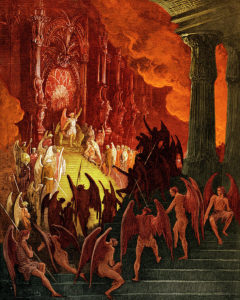
Satan in Council. Drawing to accompany Paradise Lost by Gustave Dore.
I pray this understanding of what the Devil wants can inspire some world-building ideas for speculative fiction stories.
But portraying Satan’s motivations has already happened in Christian speculative literature, from Dante’s Inferno to Milton’s Paradise Lost to Frank Perretti’s This Present Darkness. Which of these works do you find compelling when talking about what motivates Satan? How do the objectives of Satan as revealed in the Epistles relate to portrayals of Satan in literature? Any other thoughts?
 Retro-vintage distressed graphic tee ($24)
Retro-vintage distressed graphic tee ($24)











































 They rounded the corner, merging into a vaulted hallway decorated with tiles in a thousand shades of blue, and their solitude vanished. Everywhere Myrad looked, magi flowed toward the throne room where King Phraates IV, the Arsacid, the king of kings, held court. Brilliant colors rippled with their steps, every shade of the rainbow in evidence. Two men, walking close to each other and speaking in whispered tones, wore crowns bearing six palms.
They rounded the corner, merging into a vaulted hallway decorated with tiles in a thousand shades of blue, and their solitude vanished. Everywhere Myrad looked, magi flowed toward the throne room where King Phraates IV, the Arsacid, the king of kings, held court. Brilliant colors rippled with their steps, every shade of the rainbow in evidence. Two men, walking close to each other and speaking in whispered tones, wore crowns bearing six palms. Patrick W. Carr was born on an Air Force base in West Germany at the height of cold war tensions. He has been told this was not his fault. As an Air Force brat, he experienced a change in locale every three years until his father retired to Tennessee.
Patrick W. Carr was born on an Air Force base in West Germany at the height of cold war tensions. He has been told this was not his fault. As an Air Force brat, he experienced a change in locale every three years until his father retired to Tennessee.



 Netflix recently released season two of National Geographic’s sci-fi/documentary hybrid Mars. The first season was uneven but enjoyable, and the budget has been pumped up for the second go-around. The story moves at a brisk pace, starting the new season five years after the first season (spoiler alert: the Mars colony becomes sustainable) and even more years have elapsed by the time the season finale wraps up. Alas, the show is rumored to have been canceled by Nat Geo but the way the second season ended, it makes for a fairly satisfying series finale if this is indeed the case.
Netflix recently released season two of National Geographic’s sci-fi/documentary hybrid Mars. The first season was uneven but enjoyable, and the budget has been pumped up for the second go-around. The story moves at a brisk pace, starting the new season five years after the first season (spoiler alert: the Mars colony becomes sustainable) and even more years have elapsed by the time the season finale wraps up. Alas, the show is rumored to have been canceled by Nat Geo but the way the second season ended, it makes for a fairly satisfying series finale if this is indeed the case.
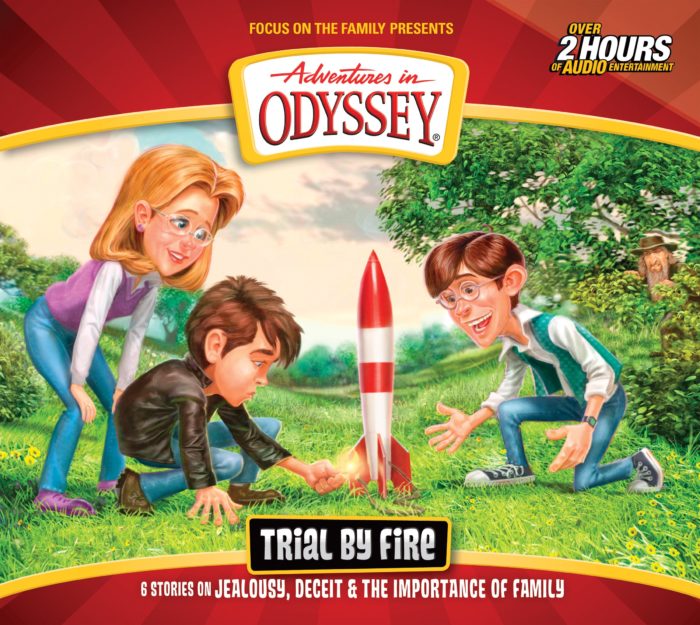

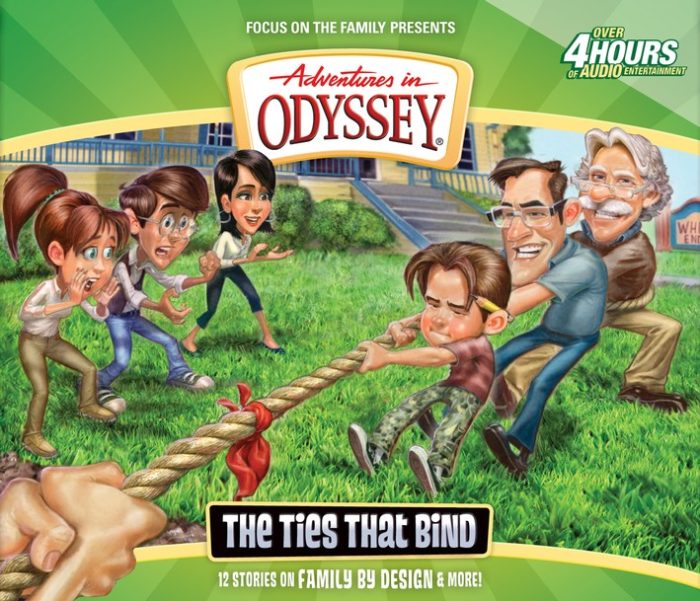

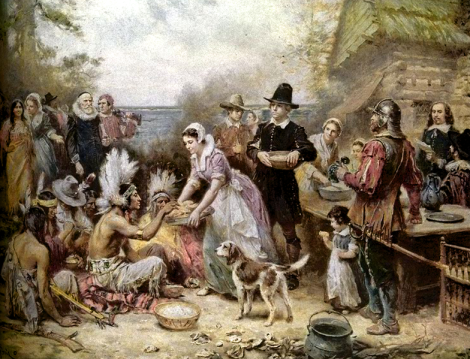
 Third, thanksgiving is expressed. Real thanksgiving has legs. It moves from being an emotion to being a demonstration, through words or actions. People giving thanks aren’t silent and they often aren’t still. Thankful people give smiles and hugs; they pack bags and fly hundreds of miles across country; they send cards and presents; they sing songs; they give at church; they get up a half hour early to pray. The cook dinners and bake pies. In short, thanksgiving is not passive.
Third, thanksgiving is expressed. Real thanksgiving has legs. It moves from being an emotion to being a demonstration, through words or actions. People giving thanks aren’t silent and they often aren’t still. Thankful people give smiles and hugs; they pack bags and fly hundreds of miles across country; they send cards and presents; they sing songs; they give at church; they get up a half hour early to pray. The cook dinners and bake pies. In short, thanksgiving is not passive. In the end, I guess that explains why we so often take time on Thanksgiving Day, and the weeks leading up to the celebration, to think about the things we’ve been given. An awareness of what we have that we did not earn puts us in a place where we can experience thankfulness and then respond.
In the end, I guess that explains why we so often take time on Thanksgiving Day, and the weeks leading up to the celebration, to think about the things we’ve been given. An awareness of what we have that we did not earn puts us in a place where we can experience thankfulness and then respond.



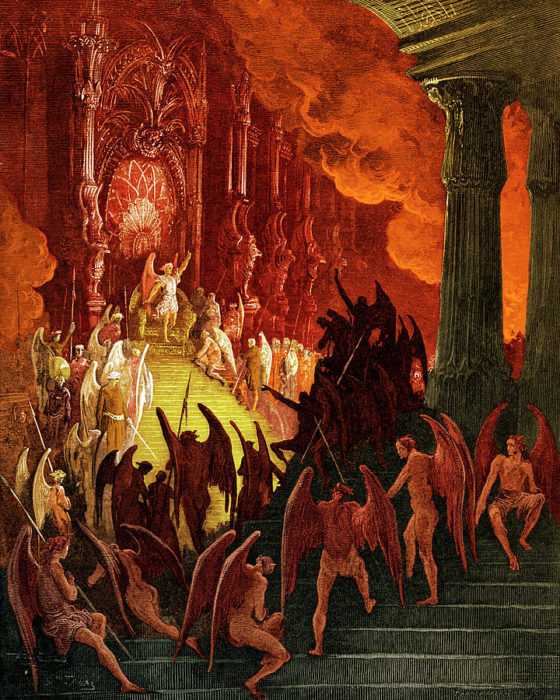


 better defenders than me. I have no native affinity for superheroes or comic books, and it took years for me to melt toward Marvel. Even now, I havenât watched a notable percentage of the movies because I do not expect to see either Loki or Captain America. I do not exactly come to praise Marvel, but neither do I come to bury it.
better defenders than me. I have no native affinity for superheroes or comic books, and it took years for me to melt toward Marvel. Even now, I havenât watched a notable percentage of the movies because I do not expect to see either Loki or Captain America. I do not exactly come to praise Marvel, but neither do I come to bury it.


